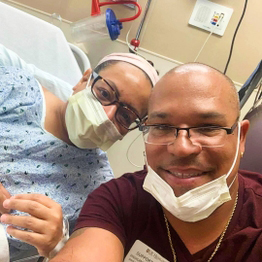
Educación de Salud y Servicios de Lenguaje
Brindamos información comunitaria y de salud a la comunidad latina para crear conciencia y conocimiento para disminuir las disparidades de salud entre los latinos. Servimos a empresas y organizaciones al proporcionar traducción al español, interpretación y evaluaciones de dominio del español.
(585) 256-8900 x152
A Lump in the Night: A Breast Cancer Cautionary Tale
From article written by Susanne Pallo for the Wilmot Cancer Institute
In the middle of a December night in 2020, Angélica “Angie” Pérez-Delgado lay in bed struggling to breathe with an otherwise mild case of COVID. Clutching her chest and trying to catch her breath, she felt something in her right breast that she had never noticed before – a golf ball-sized lump. A cold panic spread: she was six years late for a mammogram.
Pre-Surgery
Immediately, Pérez-Delgado set the earliest appointment available with her primary care provider, but because health systems were overwhelmed by COVID, it was difficult to get in for a mammogram. In mid-January, she was finally able to grab an appointment when there was a last-minute cancellation. She ended up being there all day when a mammogram led to an ultrasound and then to a biopsy.
“A couple of days later, I got that awful call that lets you know, ‘sorry, but we found cancer in your breast,’” Pérez-Delgado recalls. “That set off a whole series of events. Your life just spins. It’s crazy how quickly life can change on you.”
The next several months were a whirlwind of tests and meetings with oncologists, surgical oncologists and plastic surgeons at Wilmot Cancer Institute’s Pluta Cancer Center. By July, Pérez-Delgado had had both of her breasts and a lymph node removed and had undergone an 18-hour full breast reconstruction, which took both a physical and mental toll. She will need to take hormonal therapy for several years, but her health is stable under the care of Wilmot Cancer Institute oncologist Ajay Dhakal, M.B.B.S.
“If I would’ve just gotten my yearly mammograms, I probably wouldn’t have had to go through a double mastectomy and everything I went through,” she said. “I was really lucky that I caught it when I did – and I don’t know if I would’ve caught it if I hadn’t been bound home with COVID.”
Removing Barriers
After traveling this difficult road herself, Pérez-Delgado is now a fierce advocate for cancer screening of all kinds. As president and CEO of the Ibero-American Action League, time – or the lack thereof – was a main reason she put off getting a mammogram for six years.
Her experience helped her recognize barriers to screening that she’d never noticed before – for instance, how difficult it can be to get screening and specialty appointments. Her own cancer journey began with an urgent cancer screening that required her to come in at the drop of a hat, which may not be possible for many hourly or shift workers.
Luckily, she was in a position to remove that barrier for employees of her organization. “The Ibero-American Action League now has a policy that says that staff can take up to seven hours – outside their regular paid time off – to do any kind of screening without having to give notice,” Pérez-Delgado said. That seemingly simple policy gives workers the flexibility to take that last-minute appointment without losing precious pay or worrying about repercussions at work. While there are still many other barriers to screening, this is an easy step any organization can take to lower the bar and help their employees take charge of their own health.


Educación de Salud
Individuals Served
Interpretación en Español
Organizations Served
Traducción en Español
Organizations Served
Words Translated
2022-2023 Highlights
Health Literacy:
Proporcionamos divulgación comunitaria sobre información de salud acerca de síntomas y prevención de derrames cerebrales, detección temprana y prevención del cáncer, vacuna del COVID-19 y conectamos a las personas con servicios de atención primaria.
Language Services:
- Disminuimos las barreras del idioma al proporcionar servicios de interpretación y traducción en español a organizaciones que están ampliando su capacidad para atender a una población más diversa.
- Este año experimentamos un aumento de 31.4% en las palabras en inglés traducidas al español.




